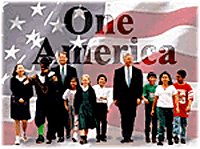 |
 |
 |
 |
TEN THINGS EVERY AMERICAN SHOULD DO
TO PROMOTE RACIAL RECONCILIATIONOne of the most striking findings from our work is that there are many Americans who are willing to accept that racial prejudice, privilege, and disparities are major problems confronting our Nation. Many of them told us that they would welcome concrete advice about what they should do. To fill that need, we offer a brief list of actions that individual Americans could take that would increase the momentum that will make us One America in the 21st century:
(1) Make a commitment to become informed about people from other races and cultures. Read a book, see a movie, watch a play, or attend a cultural event that will inform you and your family about the history and current lives of a group different than your own.(2) If it is not your inclination to think about race, commit at least one day each month to thinking about how issues of racial prejudice and privilege might be affecting each person you come in contact with that day. The more that people think about how issues of race affect each person, the easier it will be for Americans to talk honestly about race and eliminate racial divisions and disparities.
(3) In your life, make a conscious effort to get to know people of other races. Also, if your religious community is more racially isolated than your local area, encourage it to form faith partnerships with racially different faith groups.
(4) Make a point to raise your concerns about comments or actions that appear prejudicial, even if you are not the targets of these actions. When people say or do things that are clearly racially biased, speak out against them, even if you are not the target. When people do things that you think might be influenced by prejudice, raise your concerns that the person or institution seriously consider the role that racial bias might play, even unconsciously.
(5) Initiate a constructive dialogue on race within your workplace, school, neighborhood, or religious community. The One America Dialogue Guide provides some useful ideas about how to construct a dialogue and lists some organizations that conduct dialogues and can help with facilitation.
(6) Support institutions that promote racial inclusion. Watch television programs and movies that offer racially diverse casts that reflect the real world instead of those perpetuating an inaccurately segregated view of America. Support companies and nonprofit organizations that demonstrate a commitment to racial inclusion in personnel and subcontracting. Write the institutions to let them know of your support for what they are doing.
(7) Participate in a community project to reduce racial disparities in opportunity and well-being. These projects can also be good ways of getting to know people from other backgrounds.
(8) Insist that institutions that teach us about our community accurately reflect the diversity of our Nation. Encourage our schools to provide festivals and celebrations that authentically celebrate the history, literature, and cultural contributions of the diverse groups that comprise the United States. Insist that our children's schools textbooks, curricula, and libraries provide a full understanding of the contributions of different racial groups and an accurate description of our historic and ongoing struggle for racial inclusion. Insist that our news sources--whether print, television, or radio--include racially diverse opinions, story ideas, analysis, and experts. Support ethnic studies programs in our colleges and universities so that people are educated and that critical dialogue about race is stimulated.
(9) Visit other areas of the city, region, or country that allow you to experience parts of other cultures, beyond their food. If you have an attitude that all people have histories, cultures, and contributions about which you could benefit from learning, it is usually not difficult to find someone who enjoys exposing others to their culture.
(10) Advocate that groups you can influence (whether you work as a volunteer or employee) examine how they can increase their commitment to reducing racial disparities, lessening discrimination, and improving race relations. Whether we are a member of a small community group or an executive of a large corporation, virtually everyone can attempt to influence a group to join the national effort to build One America.